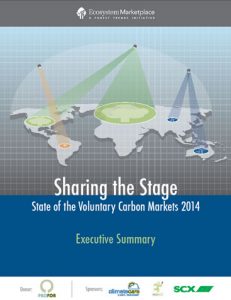Sharing the Stage, State of the Voluntary Carbon Markets 2014
By Molly Peters-Stanley and Gloria Gonzalez View PublicationLast year, voluntary carbon offset buyers threw their collective weight behind climate-led development. With many of these buyers driven to altruistically “combat climate change through their purchases, 2013 saw a record volume of offsets transacted from projects that deliver climate and community-facing outcomes (“cobenefits”) in developing countries.
KEY REPORT FINDINGS
- Across all years of market activity tracked in this report series, voluntary buyers have directly funded 844 MtCO2e in emissions reductions worth $4 billion, at an average historical price of $5.9/tCO2e.
- In 2013, offset suppliers transacted 76 MtCO2e of carbon offsets down from 102.8 MtCO2e in 2012 as structural changes in California carbon market impacted millions of previously “voluntary tonnes. Market value fell to $379 million, tracking alongside lower average prices ($4.9/tCO2e market-wide).
- The volume of offsets transacted directly from projects and as a result, through brokers steeply declined (down 40% and 58% from 2012, respectively). Retailer sales were unchanged (22 MtCO2e).
- Governments played an important market role in 2013, as both offset buyer and supplier, while private sector-led offset demand fell by 46% to 35 MtCO2e. A full 20.3 MtCO2e was attributed to multinational corporate buyers. Energy, transportation, finance, and insurance providers were also key buyer types.
- “Combating climate change was cited as buyers top offsetting motivation behind 7.2 MtCO2e in transactions. Corporate responsibility and leadership remained prominent motives. Buyers also leveraged offset payments to incentivize supply chain sustainability (a first in this report series).
- Existing client demand drove 76% of transacted volumes in 2013. First-time buyers made up the remaining 24%, but paid significantly below-average prices ($3.7/tCO2e) and with a focus on forestry.
- Projects that reduce emissions from deforestation and forest degradation more than doubled their transaction volumes to 22.6 MtCO2e, and their market value also increased by 35% to $94 million. This growth came at a (lower) offset price of $4.2/tCO2e, down from $7.4/tCO2e in 2012.
- Around 28.9 MtCO2e of 2013s transactions were associated with the Verified Carbon Standard. Market share for the Gold Standard saw little change from 2012, despite voluntary buyers increased appetite for Clean Development Mechanism instruments.
- Survey respondents reported 31.8 MtCO2e in their project portfolios that remained unsold at the end of 2013, including 12.6 MtCO2e reported by 36 suppliers that tried to but simply did not find a buyer by year end. Survey respondents also projected a potential pipeline of 277 MtCO2e through 2018.

